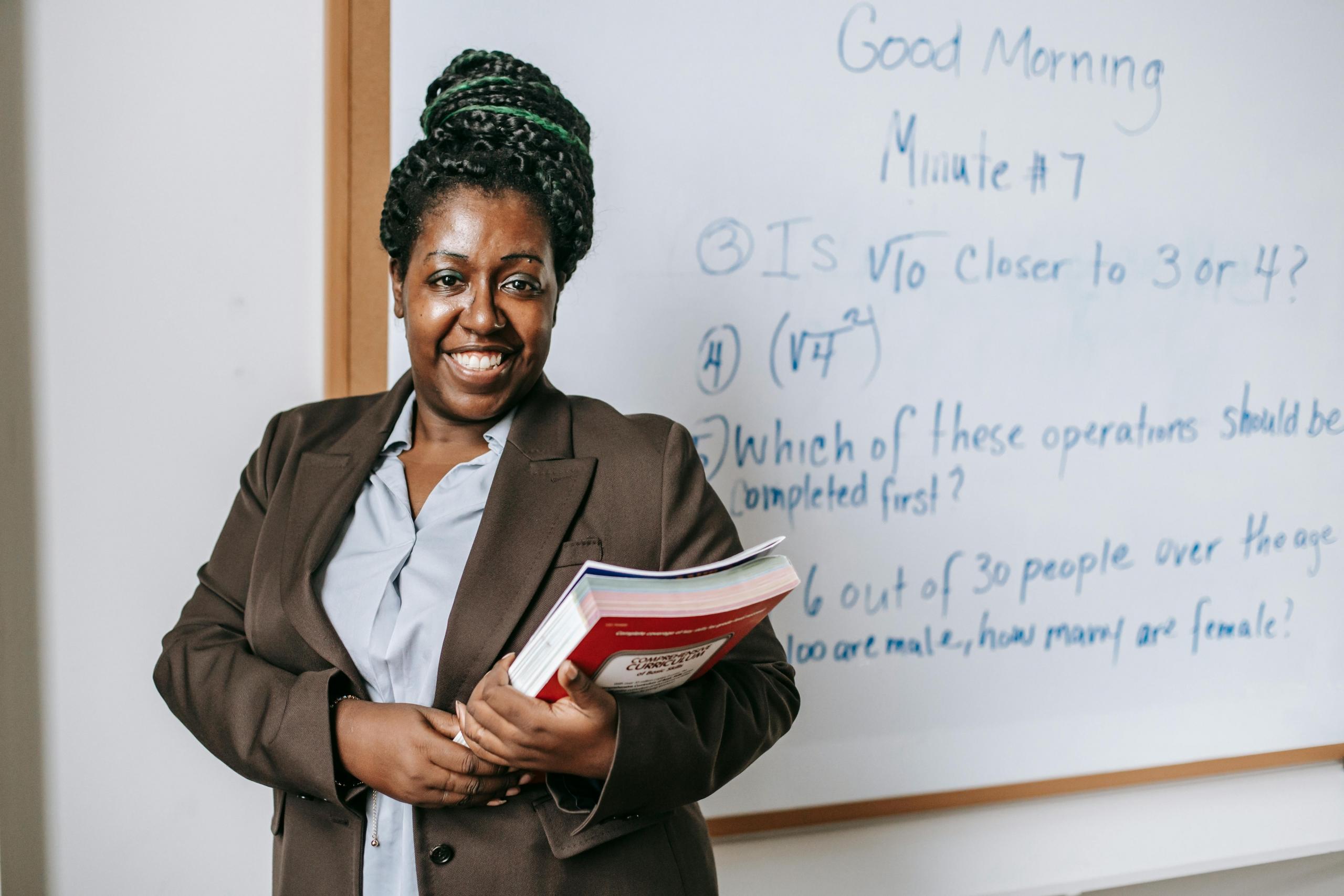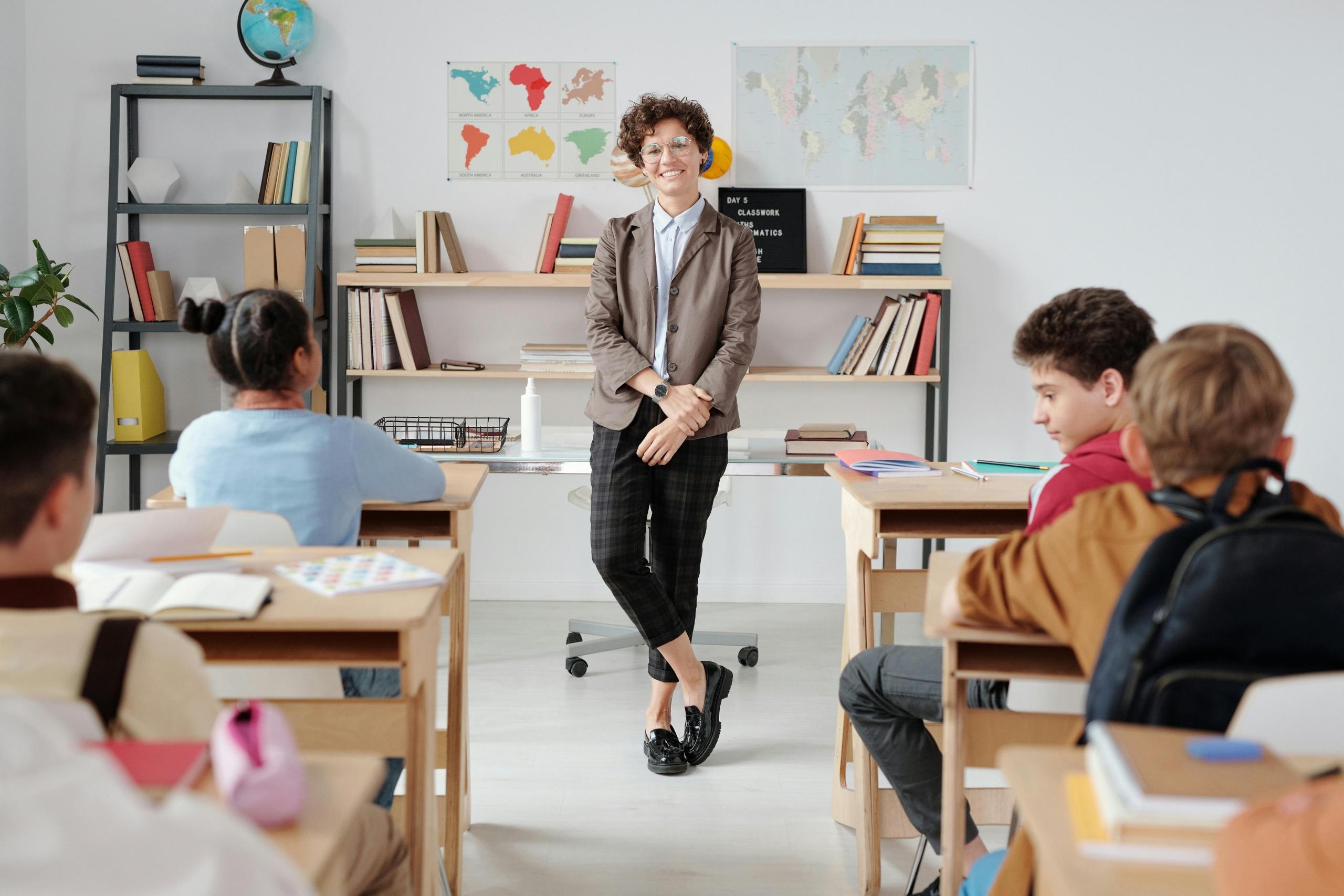Key Points
- It is important for teachers to follow the school's guidelines for appropriate attire.
- Degrees of formality will differ depending on the level you teach (eg. pre-school or high school), as well as the subject (eg. art or business studies).
- Although you have the final say, be sensible and practical in your clothing choices.
As a student at school looking at your teachers, it seems as if the teachers merely set the rules, and don't have to follow any rules. When you become a teacher at the start of your teaching journey, you’ll probably have tons of questions. One of the questions may be:
What do you wear for your first day of school?
You may be conflicted as to whether you would like to dress more professionally or more comfortably so as to handle everything that your job entails with ease.
Sometimes you even might question why teachers can't have uniforms too so that deciding what to wear each day becomes easier.
As a teacher, you need to decide what to wear on a daily basis. You also need to keep in mind that your students notice what you wear every single day and may sometimes even comment on your outfit choice.
Will you wear something bold and attention-grabbing? Or will you wear something more subtle in muted colours?
Ultimately the choice is up to you, however, we suggest that you always choose outfits that are sensible and modest.
For many teachers, being fresh out of university, a shopping trip is required as more professional clothes may be needed for them to be able to step into the classroom.
Want to give private lessons?
Join the Superprof community and share your knowledge with inquiring and motivated students.
What Are The Rules Teachers Should Follow?
While there is no nationwide dress code for South African school teachers, individual educational institutions—particularly private schools—will have specific guidelines for what teachers should wear.
The overall expectation is that teachers present themselves in a way that commands respect from both their students and colleagues and that their clothing choices align with the values of the educational environment.
Essentially, teachers need to display respectability, professionalism and practicality.
In many schools, teachers are encouraged to wear business-casual outfits. For men, this will include collared shirts and long trousers. In some rare cases, male teachers may be required to wear ties or blazers too.
Female teachers are usually allowed to wear knee-length to long dresses and skirts, trousers, and modest blouses. Some schools may require their teachers to wear formal shoes, while others allow more practical footwear, better suited to the teacher’s day-to-day activities in and outside the classroom.
Schools may adapt their dress codes to the local climate. In areas with more extreme temperatures, dress codes may be slightly more relaxed, with less formal clothing being allowed for practical reasons.
Regardless of the climate, however, teachers are always required to present themselves professionally to maintain the integrity of their establishments.
What is an Acceptable Dress Code for Teachers?
You don't want to be called into the principal's office to be given a warning for inappropriate dress, so we suggest that the minute you get a new post, you speak to the principal about getting a copy of the teacher's code of conduct.

Most private schools draft their own code of conduct for their teachers which sets out guidelines for pretty much everything related to the behaviour of the teacher (including suggestions for how to dress and warnings on how not to dress).
No matter how thoroughly you read through the teacher's code of conduct, you will still have to make some tough attire choices when you:
- Interview for another teaching post at another school
- Have to attend external school-related events
- Must attend the end of the year functions, award ceremonies, speech contests, school concerts
- Have to head a parents’ meeting
We suggest that you tow the line when it comes to buying clothes. Purchase some formal clothes, a selection of sophisticated garments, and some comfortable clothes that you will feel good in. You also might want to stock your cupboard up with what we call "work clothes", before school begins and you have to decide what to wear for your first day of school.
Does the teacher's code of conduct restrict you as much as it restricts your students?
To be honest, there are minimal restrictions on what teachers can and can't wear (remember the code of conduct is not drawn up to make teachers feel as if they are being treated like students again). Teachers are, for the most part, given lots of freedom in terms of what they can wear.

Basically, aside from offensive statements T-shirts and very short skirts, dresses and shorts, the school places the ball in the teacher's court so that each and every teacher can decide for himself or herself what comes across as appropriate dressing and what doesn't.
Most schools have a rather flexible dress code for teachers, yet if you feel uncomfortable in a certain school setting because of what you are expected to wear, consider taking up a teaching job elsewhere.
Religious schools often expect teachers to dress in very modest clothing on a daily basis. This sometimes has its perks. If all the teachers dress alike in religious attire, then perhaps they won't feel self-conscious.
Whenever you are dressing for school, remember:
When you are dressing for the day as a teacher, always look at your outfit from a students' eye view.
Roxanna Elden
So your kids will judge you or what you wear, and hopefully, knowing this fact creates an image in your mind about what you can wear and can't.
Read the Modern Teachers' Guide to find out more about teaching and to get a taste of what awaits you in the classroom.
Class Rules for Teachers for their Dressing
In terms of dress, there are a few class rules that teachers must also adhere to in terms of the way they dress.
When stocking up your cupboard, you cannot go wrong if you buy some:
- Formal pants
- Jackets, blazers, or suit jackets
- Formal shirts
- Dresses and skirts that are over your knees
- Cardigans and statement coats
If you were thinking of wearing a statement T-shirt or one publicising your favourite band, think again! Many schools do not allow their teachers to wear clothes that express their fun side.
Most educational institutions have flexible dress codes for teachers. But bear in mind that you will be setting an example for impressionable young minds.
Having your fun streak hidden is probably why many of the smaller children believe that teachers have no other lives other than being in school.
If you feel that a particular outfit crosses the dress code rules, ask some of the other teachers if they think the outfit would be appropriate or not.
While we understand that it's the comfiest to bounce around the classroom wearing loose-fitting jeans and a simple T-shirt, this ensemble is not the best attire to give off the working professional vibes that every school teacher should embody. Try to stick to a more business-like attire, such as statement pants and basic formal shirts which will allow you to move yet still gets deemed as formal wear.
These types of clothes are the order of the day unless you are the sports coach, then your choice of attire will be very different.
Invest in more versatile outfit choices that you can easily pair together.
In terms of shoes, we recommend choosing comfortable and functional shoes. As a teacher, you may be on your feet a lot, moving between classrooms throughout the day, so you don’t want to get home and have sore feet from wearing uncomfortable shoes or heels to school.
The key aspect of your outfit is the confidence that you add to the outfit. Remember your students will be ever-ready to comment on your outfit choice, so give them something to adore.
Perhaps read the article on how teachers can earn their students' respect to see if what you wear can earn you the respect you deserve as well.
Regulations for Teachers: The Closet Rules
While teachers can't be bothered about what their students are wearing, students surely worry about what teachers are wearing.
As a rule of thumb:
- Wear simple outfits so that you do not get too much attention from your students
- Change up your outfits as students can make you feel very conscious about repeating a particular outfit too much or wearing the same outfit over again
The key is being modest in the way you dress. If your students see that you are wearing something too revealing or something that they feel is inappropriate, you will end up feeling far more uncomfortable than your students.

Don't be caught off-guard when it comes to dressing expectations of teachers. Ask the principal about the tone of the dressing of the school.
Some private schools expect teachers to dress formally as if they are in the corporate environment every day.
Many government schools do not allow their staff to wear jeans at all.
Some schools insist that flip-flops and sandals not be allowed for work.
Find out all the ground rules for dressing first. Try to wear clothes that do not catch too much attention.
For a teacher, you will need to adapt to the types of clothes that you will be expected to wear to school because whether you like it or not, your abilities as a teacher are sometimes judged based on the way you dress.
Like it or not, your ability to effectively discipline students can be determined by what you wear too.
Basic Rules for Teachers
Especially when it comes to teaching smaller children who often carry tales home, you wouldn't want to wear anything that will particularly shock or distract learners. You need to ensure that students remain focused on the lesson being taught.
Parents complaining about something that you wore is not something you want to face.
In terms of the amount of make-up you should wear, don't wear too much make-up.
Be comfortable, be confident, and conceal some of your unconventional sides, and you will be great.
And remember:
"Being a teacher is like going to a family reunion every day of your entire life. You are constantly fielding uncomfortable questions from well-intentioned busybodies about your personal life, marital status, plans to have children, and why you've chosen to do that thing to your hair." - Anonymous
So prepared to handle any question that arises by dressing the part-that of a professional teacher.
Want to give private lessons?
Join the Superprof community and share your knowledge with inquiring and motivated students.
Summarise with AI:






This is a very insightful article. I think it would be very helpful is educators were also given a uniform to wear, as the students are given. But in lieu of that, I have created my own ‘uniform’ of sorts. On sport days I always wear the school educator sport uniform, at my school that’s a Tuesday & Thursday. On Monday I wear a pants, Wednesday always a dress or a skirt and then Friday is for more statement outfits (a jumpsuit, a fun print, a theme related outfit). This helps me to not get decision fatigue and also to stick to a routine. Highly recommend trying it out!
Hello Loreal,
We’re so glad you enjoyed the article. Thank you for sharing your strategy; it may be helpful to other teachers.